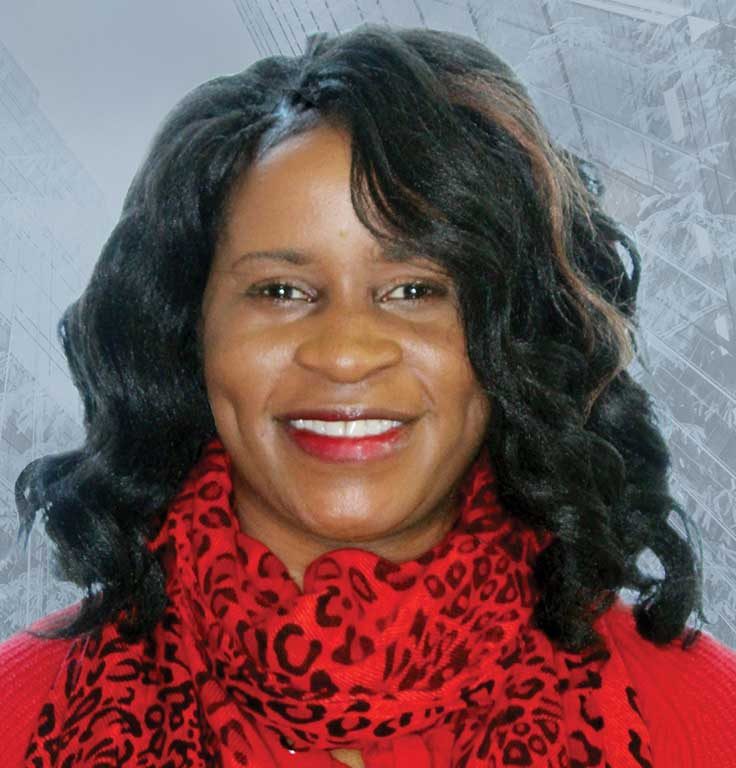
Beyond Buzzwords
Corporations have a role to play in creating a sustainable future
Addressing urgent environmental challenges around the world doesn’t only require the work of researchers, activists and governments. To truly make a difference, alumna TAMEKA SAMUELS-JONES (PhD Criminology & Law ’19) has long known, leaders of corporations will need to acknowledge the impacts their businesses can have on communities and ecosystems.

Samuels-Jones saw this firsthand growing up in Jamaica, where multinational corporations largely control the country’s valuable natural resources. She sought to make a difference by working as an investigator at regulatory institutions, but eventually became frustrated by lax enforcement that seemed to have little impact on corporations’ behaviors.
By moving to academia, Samuels-Jones hoped to better understand what motivates big companies to behave in ways that would be considered criminal if done by an individual person. And, she wondered, why do these businesses often get away with it?
Now an assistant professor of corporate responsibility and sustainability at York University in Toronto, Samuels-Jones has broadened her scope to examine how corporations can positively influence developing countries, small business owners and communities.
The practices, collectively known as corporate environmental responsibility (or CER), can range from wide-scale environmental philanthropic activities such as building wells or funding health and healing outreach to more modest efforts such as tree-planting.
In a recent interview, Samuels-Jones discusses the importance of corporate environmental responsibility and how it can expand.
What benefits come from corporate environmental responsibility?
There is, as there should be, a profit motive: An increasingly active investor and consumer base is interested in most corporations’ environmental work. They provide the company with the capital needed for the business to survive. Secondly, ensuring that the environment is cared for — from the supplier base through to the end product — protects the availability of future resources for the company and for the benefit of other users of these natural resources.
What challenges stand in the way of corporate environmental responsibility?
Getting the buy-in from some investors and corporate leadership is often one of the biggest challenges. If their priority is profit and their success is based on only short-term pecuniary results, it may make CER initiatives, which are often long-term, difficult to sell. In addition, greenwashing — the misrepresentation of a company as environmentally friendly when it is not — is commonplace. This makes it difficult to gain the attention and trust of potential consumers interested in companies practicing CER initiatives.
Your PhD dissertation focused on how Indigenous cultural beliefs and identities influence compliance in following environmental practices, particularly in Jamaica’s Blue Mountains. What were your biggest takeaways?
What I learned was that respect is far more important than any incentive, monetary or otherwise, for compliance among groups with varying levels of legal autonomy. Once the state, autonomous Indigenous groups and those that fall under state rule respect the legal authority governing each group’s environmental governance structure, this opens the door for collaboration. Few things are more motivating in environmental work than collaboratively designed regulatory practices that incorporate the value systems of the groups under consideration. Then, and only then, are the governance standards likely to be successful and adhered to among all parties.
Why is it more important than ever for organizations and institutions to start thinking about their environmental impact?
In short, it is exceedingly important for organizations to think about their environmental impact because this is it — we have one Earth. When we have diminished these resources, when enough endangered species have become extinct, we will not have a planet B. One of the most problematic issues is that many in power do not think beyond their lifetime and therefore are not implementing initiatives that will benefit generations after them. This is where new, young scholars come in. It is disheartening that our youth don’t know just how much power they hold.
What do you hope to see in the future?
More research on countries in the Global South whose corporate environmental strategies are governed by the International Monetary Fund and World Bank’s obligatory requirements. These obligations may not be best suited or tailored for these countries’ environments but must be followed to maintain funding. My hope is that younger corporate scholars will take the initiative to investigate the root causes of environmental harm in this region, the business practices that enable it, and the millions of people that are being hurt every day as a result.
Interview was condensed and edited for clarity.
This story appears in the fall 2022 issue of Ytori Magazine. Read more from the issue.


